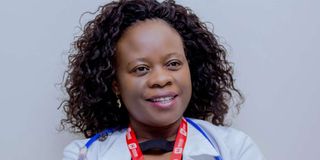#BehindEveryPatient: Campaign celebrating cancer caregivers

October is the breast cancer awareness month and Dr Catherine Nyongesa, a clinical oncologist at KNH, says early breast cancer screening is critical to secure treatment.
What you need to know:
- Approximately 4,500 patients are diagnosed with breast cancer every year.
- Kenya Network of Cancer Organisations, Kenyatta National Hospital and Aga Khan University Hospital on Monday launched a campaign dubbed #BehindEveryPatient to celebrate caregivers.
- More facilities offering cancer treatment should be put up to reduce cost of treatment.
Approximately 4,500 patients are diagnosed with breast cancer every year, making it the leading cause of cancer-related deaths for women in Kenya.
These patients rely on caregivers both in the medical field and those offering palliative care. It is for this reason that a few organisations launched a campaign to recognise the caregivers’ work.
Kenya Network of Cancer Organisations (Kenco), Kenyatta National Hospital (KNH) and Aga Khan University Hospital (AKUH) on Monday launched a campaign dubbed #BehindEveryPatient.
It will take place this month, the Breast Cancer Awareness Month to celebrate patients, survivors, health care professionals (HCPs) and caregivers.
Stronger policies
Kenco chairperson Catherine Wachira said the campaign will bring the much-needed attention to the plight of women affected by breast cancer in Kenya, whose difficult situations have been further complicated by the Covid-19 pandemic.
She added that it is her hope that showcasing inspiring stories of patients, HCPs and caregivers will help demonstrate the need for stronger policies to improve breast cancer patients’ access to quality health care and the innovative treatments available.
“Health care professionals and caregivers not only deliver quality treatment and care, but deliver hope and strength to their patients. Caregivers are normally drained emotionally and they usually need psychosocial support,” she said.
Ms Wachira also called on women to do self-breast examination regularly to detect any abnormalities or changes in their breasts.
Free screening
Dr Catherine Nyongesa, clinical oncologist at KNH, said early breast cancer screening is critical to secure treatment.
She asked women to be on the look out for lumps in their breasts, nipple discharge and change in breast size as it could be a pointer to a possible presence of breast cancer.
“It will be good if county hospitals can conduct free breast cancer screening and also offer information on cancer. Many more facilities offering cancer treatment should be put up which can go a long way in reducing cost of treatment. There should also be a robust campaign to have women undergo early breast cancer diagnosis," said Dr Nyongesa.
The oncologist noted that 75 per cent persons with breast cancer are usually diagnosed late when the disease is at third and fourth stage, and difficult to treat.
Critical teams
She, however, noted that about 80 per cent of breast lumps are not cancerous.
“Chances of cancer recurring when discovered while in stage one or stage two are lower than when it is discovered in stage three or four. However, there is a chance that cancer can still recur even if diagnosed early,” she said.
She noted that genetics and lifestyle is key in cancer development saying as one gets older, the risk of getting breast cancer also increases.
Frank Loeffler, Country Manager East Africa at Roche, said his organisation recognises these critical teams and looks forward to continuing to work with healthcare professionals to reduce the barriers patients encounter on the way to diagnosis, treatment and ultimately recovery.
Cancer survivor
“At Roche, we recognise that a strong health workforce is important to health systems that can meet the needs of patients,” said Mr Loeffler.
Roche is a Swiss multinational healthcare company and has partnered with advocacy groups in Kenya and South Africa to appreciate HCPs who have ensured patients receive the necessary care, especially amid a pandemic.
In Kenya, the company is working with the Kenya Network of Cancer Organizations, KNH and the AKUH.
Lucy Njeri, a breast cancer survivor, pressed for free cancer treatment in public hospital saying many patients die after losing hope due to the high cost implications.
She also rooted for early screening in villages and at the community level. The mother of three stressed on the need to set up counselling centres for those diagnosed with the disease.




